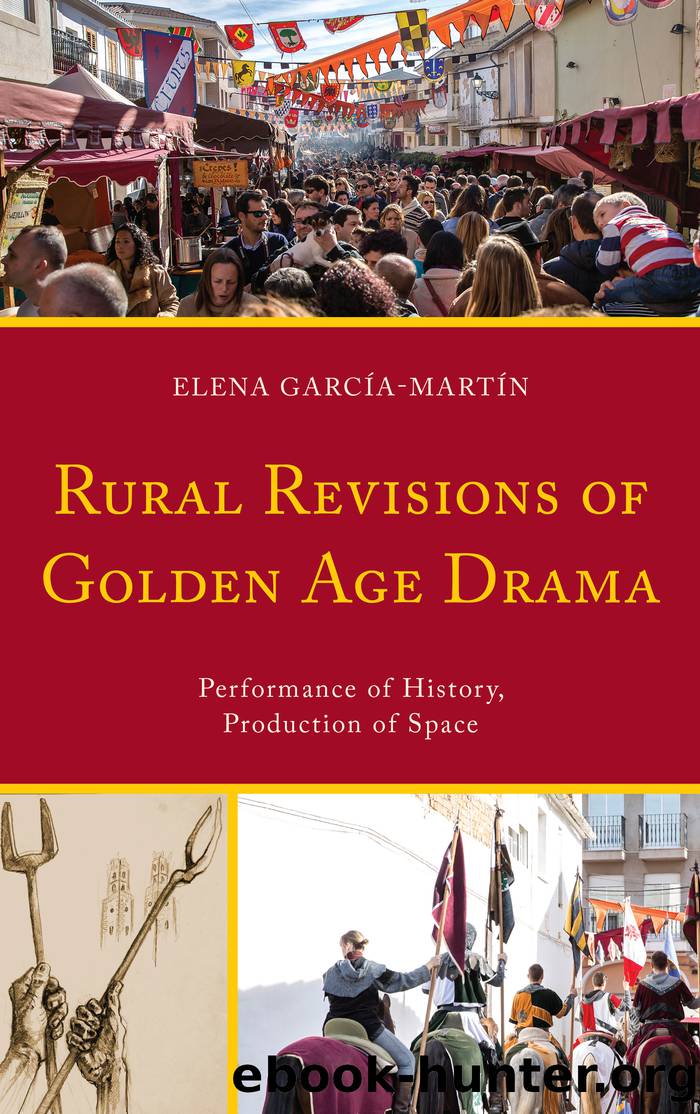Rural Revisions of Golden Age Drama by García-Martín Elena;

Author:García-Martín, Elena;
Language: eng
Format: epub
Tags: undefined
Publisher: Bucknell University Press
Published: 2012-08-15T00:00:00+00:00
The events here related revolve around hypothetical circumstances that may have led Calderón to select this particular historical episode as the topic for his play. The veracity of the actual episode âwhich is represented as it happenedâ is never questioned. Furthermore, the facts are situated within verifiable spatial coordinates: the oak tree where the protagonist is raped, the beam from where the Captain was hanged, and the house where the Mayor and his descendants lived. These material vestiges of history are in fact the protagonists of the account, responsible as they could have been, for sparking Calderónâs imagination. But we, as readers, are also engaged in this imaginative game, for we are invited to picture the bard himself entering the town âby carriageâ agitating the âpacific residents,â unaccustomed to the presence of illustrious visitors from the capital.
The reference to the rural simplicity dazzled by metropolitan sophistication may be taken ironically and, at the very least, raises issues of collective identity. But in its own performativity as a meta-fictional act this Internet site may serve to counter the aforesaid perception of simplicity with the authorâs implicit position of creative sophistication and ironic distance. Significantly this parallelism also functions to downgrade the canonical authority by which some imaginative actsâthose of consecrated ancient authorsâare privileged over others originated in hearsay or oral tradition. It is possible to read this piece as a site of resistance, as a cultural performance vindicating communal artistic, theatrical, and even, we could say, historical production. When perceived in this light, the categories of truth and fiction become relativized and a new hierarchy is created by which the testimony of an unidentified woman or the word of a resident in reference to a lost document are as valuable as the position of scholars or canonical dramatists for our perception of history. Oral tradition and collective memoryâeven when triggered by imaginationârelocate cultural agency in the hands of the people and allow them the possibility to establish an entirely different connection to their heritage.
There is a form of reverse prestige at work here. Theatre is ultimately a commodity, and as such, its consumption is marked by a series of economic parameters that contribute to the marketability of the experience through its delivery of pleasure. Stanley Kauffman argues that, in general, the high price of theatre tickets is not only an economic necessity but also part of the theatre-going thrill that guarantees exclusivity.[117] Indeed, the effect of the reasonable ticket price for El alcalde (eight euros) is exactly the opposite because it speaks of democratization rather than exclusivity. Partly as a result of the prices, the performances regularly sell out in advance, and this occurs despite warnings of inclement weather. In the summer of 2003 I was lucky to attend the Saturday performance, which had to be interrupted because of an untimely storm, only to be resumed an hour later to the delight of a drenched but satisfied audience.
This populist effect is further facilitated by the timing of the performance concurrent with the annual summer festival.
Download
This site does not store any files on its server. We only index and link to content provided by other sites. Please contact the content providers to delete copyright contents if any and email us, we'll remove relevant links or contents immediately.
Call Me by Your Name by André Aciman(19896)
Ready Player One by Cline Ernest(13978)
How to Be a Bawse: A Guide to Conquering Life by Lilly Singh(7154)
Wiseguy by Nicholas Pileggi(5315)
The Kite Runner by Khaled Hosseini(4950)
On Writing A Memoir of the Craft by Stephen King(4661)
Audition by Ryu Murakami(4612)
The Crown by Robert Lacey(4570)
Call me by your name by Andre Aciman(4463)
Gerald's Game by Stephen King(4372)
Harry Potter and the Cursed Child: The Journey by Harry Potter Theatrical Productions(4313)
Dialogue by Robert McKee(4160)
The Perils of Being Moderately Famous by Soha Ali Khan(4064)
Dynamic Alignment Through Imagery by Eric Franklin(3919)
Apollo 8 by Jeffrey Kluger(3512)
How to be Champion: My Autobiography by Sarah Millican(3493)
The Inner Game of Tennis by W. Timothy Gallwey(3472)
Seriously... I'm Kidding by Ellen DeGeneres(3412)
Darker by E L James(3405)
